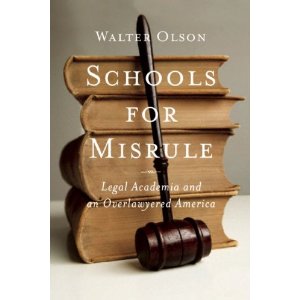Criticism continues to mount (“shameful,” “excessive”) over lawyers’ effort to nab $223 million in fees for representing Indian tribes’ interest in the long-running Cobell litigation over management of trust funds. [BLT (quoting former Sen. Byron Dorgan, D-N.D.), and more (DoJ); PoL; earlier here and here (Kilpatrick Stockton lawyer Keith Harper considered for Tenth Circuit appointment)]
Woman sues TV station that broadcast wrong lottery numbers
“If you’ve ever doubted the wisdom of letting lawyers run our country, read this book”
 Conservative Book Club has this write-up of my forthcoming book Schools for Misrule. David Frum’s FrumForum is featuring it as well. Glenn Reynolds (Instapundit) just got his in the mail. From what I hear, copies of the book ordered online began arriving in readers’ mailboxes around Tuesday.
Conservative Book Club has this write-up of my forthcoming book Schools for Misrule. David Frum’s FrumForum is featuring it as well. Glenn Reynolds (Instapundit) just got his in the mail. From what I hear, copies of the book ordered online began arriving in readers’ mailboxes around Tuesday.
More: Legal Skills Prof Blog, Young Americans for Liberty (on my Cato speech this upcoming Thursday). And a great preview post from Carter Wood at NAM’s ShopFloor.
Mopping up the Madoff mess
$1.3 billion in fees are headed toward lawyers and consultants [FT via Salmon]
“Please Send News Tips By E-Mail, Not By Posting Off-Topic Comments”
Advice given at the Volokh Conspiracy blog, and good advice here too.
“Mining giants bury Canadian critics with lawsuits”
Barrick Gold and Banro Corporation have sued three authors of a book that alleged human rights violations in African mining operations; Barrick has also threatened suit against a Vancouver-based publisher over a not-yet-published book. [BoingBoing, Canadian Business, Quill and Quire; FreeSpeechAtRisk.ca]
Why Toyota stock rose after yesterday’s recall
P.S. Also, welcome listeners from Richmond, Va.’s WRVA, which had me on to discuss these issues this morning. And a retrospective on the Toyota scare from The Truth About Cars’ Edward Niedermeyer.
February 25 roundup
- “Lawyer held in contempt for advising clients to retake foreclosed home” [Ventura County Star, earlier]
- Some perspective on Wisconsin Gov. Walker’s plans: about half the states curtail some or all public-sector unionism [Barro]
- Guy who sued over Jimmy Carter book offers his side of story [Turley, earlier]
- “Disbarment recommended for litigator Chesley over fen-phen fees” [NLJ, PoL, previously on scandal] Kenneth Feinberg affidavit in case draws scrutiny [Steele/LEF, Frank/PoL]
- Mississippi: “Minor, 2 ex-judges disbarred by state Supreme Court” [Sun-Herald, related on scheduled resentencing, earlier]
- “AIG Ended Up Having To Pay Millions For the Duke Lacrosse Stripper Lawsuit” [Business Insider, earlier]
- Labor Department hotline to put workers in touch with private lawyers [Fox Biz, Wood/PoL]
- Underage man on hook for child support to older woman [seven years ago on Overlawyered]
Wife: city improperly demoted hubby for dating subordinate
California: “The wife of a Roseville city employee has filed a $3.9 million claim against the city alleging it improperly demoted her soon-to-be ex-husband for his extramarital interoffice romance.” [Sacramento Bee]
New Benjamin Barton book, “The Lawyer-Judge Bias in the American Legal System”
A review copy arrived recently and I’ve much enjoyed reading the first chapters. It’s discussed by Larry Ribstein, by Glenn Reynolds, and by Cato’s Dan Mitchell (with special reference to the problem of tax complexity). The publisher’s description:
Virtually all American judges are former lawyers. This book argues that these lawyer-judges instinctively favor the legal profession in their decisions and that this bias has far-reaching and deleterious effects on American law. There are many reasons for this bias, some obvious and some subtle. Fundamentally, it occurs because – regardless of political affiliation, race, or gender – every American judge shares a single characteristic: a career as a lawyer. This shared background results in the lawyer-judge bias. The book begins with a theoretical explanation of why judges naturally favor the interests of the legal profession and follows with case law examples from diverse areas, including legal ethics, criminal procedure, constitutional law, torts, evidence, and the business of law. The book closes with a case study of the Enron fiasco, an argument that the lawyer-judge bias has contributed to the overweening complexity of American law, and suggests some possible solutions.
